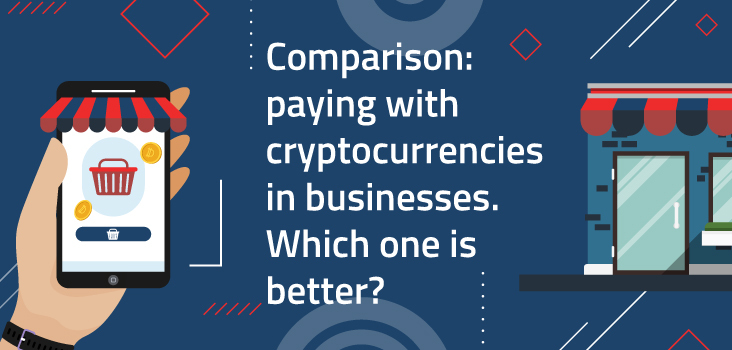Written by Davies on cryptocurrencies / Reading time: 5 minutes.

Of course, in the very same way it happens with fiat currencies, not all cryptocurrencies are similar. They can be more or less strong, more or less stable, based on this or that technology, backed by a more or less powerful user community… There are so many factors that can affect features and characteristics of a cryptocurrency.
These details will obviously make some cryptocurrencies more useful than others when performing diverse tasks. Today we’ll keep our focus in a very important application for quite a bunch of users: using them as a means of payment in businesses. Which one is the most appropriate for that service? Keep reading, let’s discover the answer!
How to pay in businesses using cryptocurrencies
Before deciding which cryptocurrency fits best for the task of paying in businesses, there are a couple of important details you should keep in mind:
- Not all shops accept payments with cryptocurrencies. Electronic currencies have been among us for some time, the first one was developed in 2009, and thanks to their many advantages (including transaction speed, reduced fees or reinforced safety) they’re becoming increasingly popular, with a growing number of users. But a large part of the population, and therefore also of the stores, still don’t know them or haven’t shown any interest for them. This means that payment using cryptocurrencies in shops will be impossible (or almost, as we’ll check out later) in many places. So you’ll have to choose wisely.
- Not all cryptocurrencies let you pay in shops. Although many cryptocurrencies are slowly enabling that feature, most of them have focused so far in purely virtual operations, only through the net. There are not so many of them to have taken the step forward to the physical world. So maybe there are cryptocurrencies with very interesting value and properties that are nevertheless useless for this purpose.
Payments with cryptocurrencies are often performed through an app for mobile devices. A direct transfer can be done, maybe an in-screen code needs to be scanned, or perhaps NFC wireless data transmission technology can be used, which requires both phones to be physically close, or at least at a not too big distance so that they can be linked.
They may also require either the buyer and the seller to have accounts in the same cryptocurrency, or at least to have a payment processor which lets you work easily with many different ones (with the disadvantage of charging a fee for each operation).
Some cryptocurrencies that allow payments in shops
Taking into account all that, let’s see some cryptocurrencies that let you make payments in businesses with relative ease:
- Bitcoin. Arguably the most famous cryptocurrency in the world (due to the fact of being the oldest one) and probably the first one that comes to your mind if asked about this type of financial assets… despite there are many others that have taken over it in technology and reliability. Being the leader makes it also the preferred option for businesses who have decided to accept this system. Towards the user, its main disadvantage is that its value is so volatile: it can rise a lot in a little time (currently, at the beginning of November, it’s in uptrend) ... and suddenly drop later.
- Ethereum. Probably the greatest alternative to Bitcoin, it’s currently the second most used cryptocurrency. Its technology is also the basis for many others, such as Davies, that have become ERC20 tokens. Its blockchain is its main strength, as it’s been the first one to develop decentralized apps and smart contracts.
- Ripple. Some people don’t consider it a ‘pure’ cryptocurrency, as it doesn’t have value by itself; besides, we’re talking about a centralized currency: the issuer company acts as a central bank and keeps the right to disallow or ban operations. Its main perk is that it’s especially adapted for international payments and that it’s backed by many important banks all around the world, including Spanish BBVA.
- Litecoin. Born to be a direct challenger to Bitcoin, it works in a very similar way, but solving its main weaknesses related to safety and mining capacity. Its main disadvantage is precisely that it has to race against Bitcoin and the other giants, which leave a very narrow market quota; this means many shops don’t think adopting it is worth the trouble.
- Dash. It’s an American currency that is getting famous in Latin America, especially in countries such as Colombia, Venezuela or Argentina. It’s pretty fast and their privacy features are remarkable, despite having suffered some code error issues which, although they’ve already been solved, maybe don’t make this coin the safest one.
Davies: the most appropriate option to pay with cryptocurrencies in businesses
Being an ERC20 token that runs over the Ethereum blockchain, Davies can be used as a means of payment with cryptocurrencies in the traditional way, identical to how the previously listed currencies work.
But it also integrates an innovative possibility that makes it the ultimate cryptocurrency to pay in any shop in the world. Due to a deal with VISA, debit and credit cards linked to cryptocurrency accounts will be issued soon.
This means you’ll be able to pay using your cryptocurrencies in all shops accepting VISA cards as usual. That’s several tens of millions of physical stores everywhere in the world, apart from countless e-commerce sites on the Internet. And do you remember the “almost” we said before on reference to paying with cryptocurrencies in shops that haven’t adopted the required technology (and aren’t willing to do it)? That “almost” disappears too!
Thanks to VISA cryptocurrency cards there are no limits. Forget about payment processors, compatibility issues or any other problem you may think about. Having a common POS capable of reading bank cards is enough to proceed with the purchase and sale easily.
Would you like to know about other ways in which Davies can help you improve your daily life? Keep reading our blog, we’ll tell you more soon!
